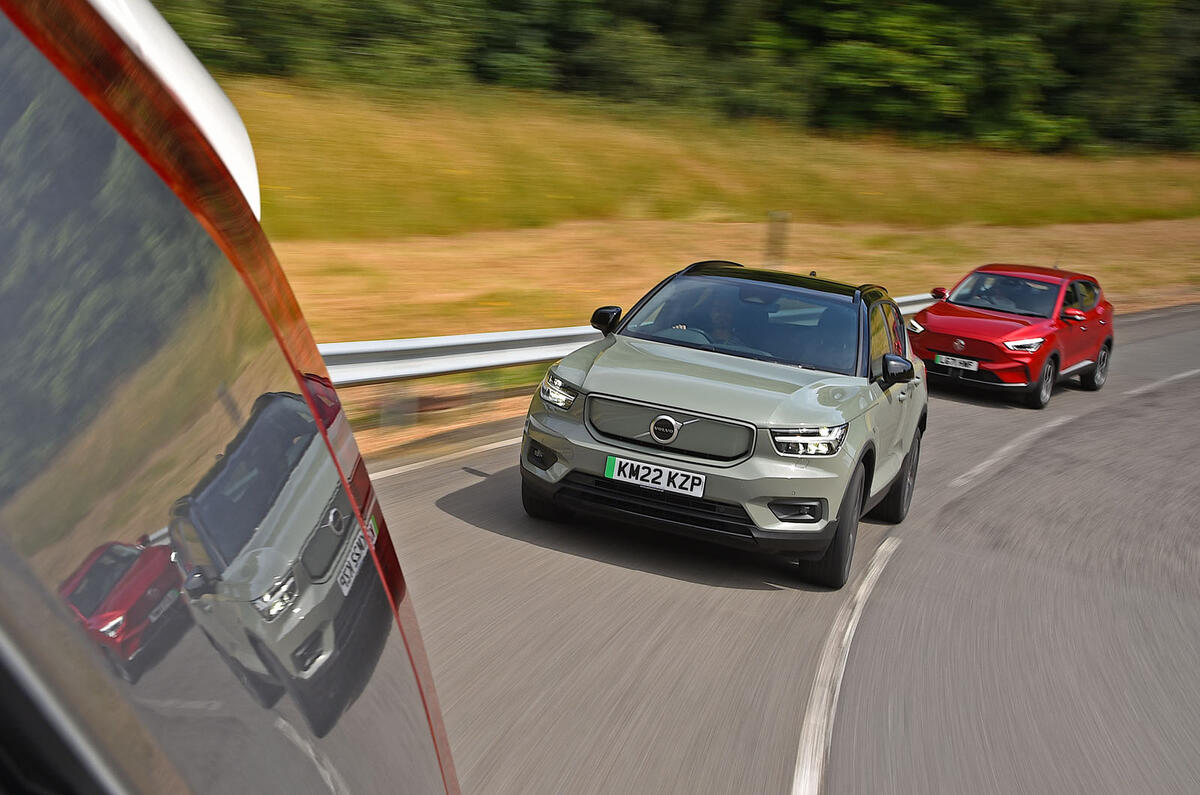Used electric cars are representing better value to second-hand buyers, as their prices undercut some combustion-engined equivalents.
Cox Automotive, which owns Manheim Auctions, has reported a “stabilisation” in used vehicle prices, especially for EVs, which are now typically cheaper to buy than equivalent diesels and free of the economic volatility that dogged them earlier in the decade.
The average price of a two-to-four-year-old EV sold by Manheim Auctions was £15,142 as of this week, up 1.1% (£162) from January but down 6.5% (£1,061) year on year.
That was 23% (£3477) cheaper than an equivalent diesel car, the average price of which was £18,619 in February – down 0.8% (£148) month on month but up 6.9% (£1208) year on year.
Equivalent petrol cars still undercut EVs at £13,392 in February (11.6% or £1750 cheaper than an EV), but the gap narrowed during the past year, as average used petrol values rose by 2.4% (£304) month on month and by 4% (£509) year on year.
Cox said the used EV parc was in for “a significant growth trajectory over the next four years”, with volumes increasing by 117.5% by 2028.
It added that dealers – many of which recently shunned second-hand EVs due to price volatility and even introduced buying bans – had begun to acknowledge their value, as they were typically selling faster and performing well, while cheaper examples could look like bargains.
A survey by Cox and Regit, a provider of car management tech, found that 69% of drivers wouldn't be willing to pay more for an EV over a petrol or diesel alternative, so the “prospect of lower priced used EVs could help drive adoption”.
However, Cox added that second-hand EVs weren't without their issues. In its latest Insight Quarterly report, insight director Philip Nothard wrote that the "used market for EVs is expected to remain fragmented, as they are generally priced lower than their ICE counterparts, posing challenges when it comes to retaining their value".
He continued: “This, combined with regulatory pressures, including VAT charges on charging, the changes to benefit-in-kind [tax] rules for PHEVs (which could drive up the rate for certain models from 8% to 24%), Vehicle Excise Duty [from April] and the prospect of road pricing means that an air of uncertainty lingers around the used electric market.”
In its new car market forecast, Cox estimated that EVs would account for 24% of UK registrations this year, followed by 30% in 2026, 34% in 2027 and 36% in 2028. Based on current targets, those figures would trail the ZEV mandate targets by three, four and 16 percentage points respectively.
Cox said it expected the total number of used car transactions to remain flat this year, with 7.6m anticipated by the end of 2025, but predicted values to remain strong, due to the shortage of new vehicles built during the Covid and post-pandemic eras.
Nothard said this was “likely to continue into 2026, until prices begin to return to standard depreciation patterns".
He added: “Supply and demand are central to the dynamics of the used car market but successful retailers must go deeper. Stock profiling – ensuring the right mix of vehicles aligns with market needs – and strategic stock sourcing are now more crucial than ever.”




Join the debate
Add your comment
Many 2nd hand car buyers don't drive enough miles to save much money by having a EV.
It is uncommon for them to allready have a charger installed on their droveway, so that is an addational £1k cost along with a few days finding the corect trade person to do the work. Then spending time understanding the best electricity tariff.
We then have lots of confusion in the trade, sales staff that don't personally drive EVs, local garages that tell customers to advoid EVs (no profit doing a regular oil change on a EV.....) Often cars are not charged ready for test drives.
But as my wife is disabled so needs an automatic, our next replacement car will be an EV. However I have never replaced a car that is economic to repair so hopefully will not need to buy the EV for a few more years, it will replace a 20 year old Polo. I always buy cars between 3-5 year old as they tend to give lowest cost per year of ownership.
It understanding that diesels cost more as a meaningful number of 2nd hand buyers wish to tow caravans. EVs tend to be higher trim levels that many petrols.
Aftermarket battery warranties are available. It's easier to test the state of health of an old battery than it is the health of an old engine.
Costs of batteries?? You can repair them these days or get a used replacement. You don't have to buy a new one. Have you seen the price of a replacement engine for a modern car??
SMMT figures show that used EV market is doubling every year and is growing far faster than the ICE used car market.
It's just the cross over point. EV residuals are still continuing to fall much faster than petrol, diesel, hybrid, etc.
This is because 2nd hand buyers are terrified of the huge costs or replacing batteries. Especially as those cars get closer to being out of warranty. Maybe irrational, but the used car market does function on basis of rational arguments.
Did you read the article? Polestar, Volvo, Tesla, MG BEVs do not depreciate must faster than their petrol equivalents etc.